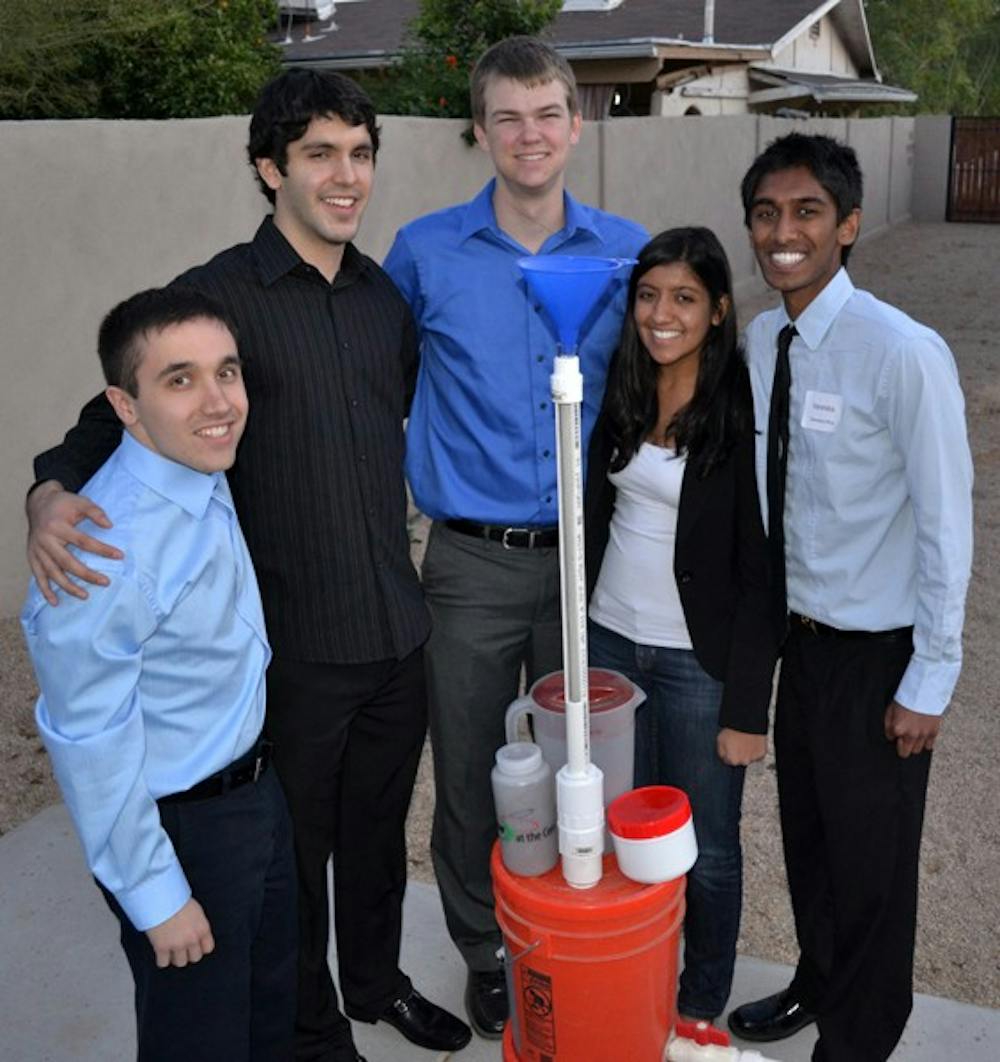 Biomedical engineering students (from left to right) Paul Strong, Mark Huerta, Connor Wiegand, Pankti Shah, and Varendra Silva form “33 Buckets,” an Engineering Projects in Community Service team that built a prototype water filter. The students are working to raise money to go to Bangladesh to install the filter in a school this summer. (Photo by Brittany Lea)
Biomedical engineering students (from left to right) Paul Strong, Mark Huerta, Connor Wiegand, Pankti Shah, and Varendra Silva form “33 Buckets,” an Engineering Projects in Community Service team that built a prototype water filter. The students are working to raise money to go to Bangladesh to install the filter in a school this summer. (Photo by Brittany Lea)A group of engineering students is working to create an electricity-free water filtration system for a girls’ school in rural Bangladesh.
The students call their project “33 Buckets” and created the system, which uses gravity to filter water for drinking and cleaning, as part of the Engineering Projects in Community Service program at the Ira A. Fulton Schools of Engineering.
The students at the Rahima Hoque Chetonabikash Girls College, in the village of Baherchar Barakanda, use water from a well contaminated with arsenic. The school needs 2,000 gallons of water daily to operate.
The mechanical parts of a water filter usually need electric energy, but the team wants to work with gravity alone and pump water from the roof of the school.
“(The filter) is made with low-cost basic supplies,” team member and mechanical engineering junior Paul Strong said. “This will mean better health at a much cheaper price for the girls.”
The filter would work in three stages. The contaminated water is first chlorinated and goes through activated charcoal that takes out pesticides and the chlorine. Then Layne RT, an arsenic absorbent, is added before the water goes through sand to remove debris.
The team will begin testing the prototype in March and would like to be in Bangladesh to install it in May.
“I think that most of the testing will be done before or during spring break,” team leader and biomedical engineering junior Pankti Shah said. “By then we will have a detailed idea of how to build the big filter in the school.”
When Shah and her teammates, including Strong and biomedical engineering junior Varendra Silva, first heard about the contaminated water two years ago, they were immediately interested in finding solutions.
A year later, biomedical engineering junior Mark Huerta and biomedical engineering sophomore Connor Wiegand joined the project.
They want to filter 2,000 gallons of water for the school each day and create a filter big enough to produce an additional 2,000 gallons, which the girls could sell at a low cost to the community to generate revenue for the school.
“The filter is important, although equally important is creating a micro-finance business where the girls can sell the extra water to fund replacement parts for the filter,” Wiegand said. “It would become self-sufficient.”
The team hopes that by allowing the girls to sell the excess water will give them knowledge and tools they can apply to other areas, Huerta said.
“This is a really cool opportunity for the girls,” Huerta said. “They will have water as well as valuable business skills.”
The name “33 Buckets” comes from the atomic number of arsenic and the filtration system’s frequent use of buckets, Silva said.
“We will clean the arsenic out of the water one bucket at a time,” Silva said.
The “33 Buckets” team has applied for grants and innovation to raise funds for the cost of the trip and is trying to pitch their project to the American Society of Civil Engineers.
Reach the reporter at dpbaltaz@asu.edu
Click here to subscribe to the daily State Press newsletter.




